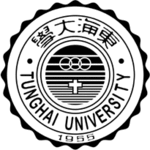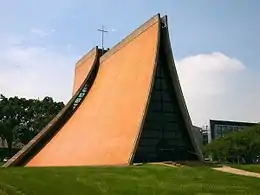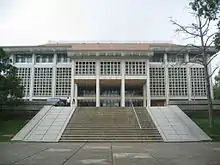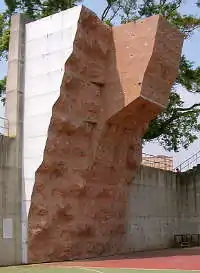Tunghai University
Tunghai University (THU; traditional Chinese: 東海大學; simplified Chinese: 东海大学; pinyin: Dōnghǎi Dàxué) was founded by Methodist missionaries in 1955 as a comprehensive university, the first private university and the second oldest university in Taiwan. The university is located in Xitun District, Taichung, Taiwan, an urbanized area. On the grounds, the Luce Memorial Chapel (designed by noted architects Chen Chi-kwan and I. M. Pei) is a local landmark. The logo of the university contains a cross in reference to the statement in the founding documents that it was "founded in the love of Jesus," and the three linked circles refer to the Holy Trinity as well as the motto, "Truth, Faith, Deeds".[1] The university shares its name with Tokai University in Japan. The two universities have since entered a partnership agreement.
東海大學 | |
 | |
| Motto | 求眞 篤信 力行[1] |
|---|---|
Motto in English | Truth, Faith, Deeds[1] |
| Type | Private |
| Established | 1955 |
| President | Mao-Jiun Wang |
| Location | , 24°10′41″N 120°36′13″E |
| Campus | Suburban, 1.35 km2 (0.52 sq mi) |
| Affiliations | AALAU, ACUCA, United Board[2] |
| Mascot | None |
| Website | www.thu.edu.tw |
| Tunghai University | |||||||||||
|---|---|---|---|---|---|---|---|---|---|---|---|
| Traditional Chinese | 東海大學 | ||||||||||
| Simplified Chinese | 东海大学 | ||||||||||
| Literal meaning | East (China) Sea University | ||||||||||
| |||||||||||

History
Tunghai University was founded on the Dadu Plateau, west of Taichung City, in 1955 by Methodist missionaries.[3] The sitting US Vice President, Richard Nixon, had spoken at the ground-breaking ceremony in 1953.[4] The school was named "Tunghai" ("east sea") based on its position east of the Taiwan Strait.[5]
List of presidents
- Beauson Tseng, 1953–1958
- Wu Teh Yao, 1958–1972
- Ming-Shan Hsieh, 1972–1978
- Mei Ko-wan, 1978–1992
- Ta-Nien Ruan, 1992–1995
- Kang-Pei Wang, 1995–2004
- Haydn Chen, 2004–2012
- Ming-Jer Tang, 2013–2015
- Mao-Jiun Wang, 2016–present
Academics
Tunghai University is organized into nine colleges of agriculture, engineering, fine arts & creative design, humanities (called the "College of Arts"), international studies, law, management, science, and social science, which contain 34 academic departments.[6]
Library

The Tunghai University Main Library is located at the end of the Campus Mall. Library holdings include, approximately, 600,000 volumes, 6,515 current serials, 21,523 electronic serials, nonprint formats, and rare books.[9]
Student societies

Tunghai has more than one hundred student societies. The Wei-Mei Climbing Wall was completed in 2004, in memory of Wei-Mei Lin, a leader of the Mountain Climbing Club, who died in a mountain accident in 2001. It is 12 meters high and 9 meters wide. In 2007, the wall burned down. It is now being rebuilt.
Notable alumni
- Chen Long-bin, sculptor
- Chiu Ching-chun, Magistrate of Hsinchu County (2009–2018)
- Chung Ling, writer, critic, educator and translator
- Pei-yuan Chia (1961), retired Citicorp executive
- Ho Min-hao, member of Legislative Yuan (2002–2008)
- Ho Ping, film director
- Kolas Yotaka, spokesperson of Executive Yuan
- Che-Ming Ko, nuclear physicist
- Liau Huei-fang, Deputy Minister of Labor (2016-2017)
- Ping-hui Liao (1976), professor of Taiwan studies
- TC Lin (1988 exchange student), filmmaker, photographer, and writer[10]
- Pan Shih-wei, Minister of Labor (2014)
- Tien Hung-mao, Minister of Foreign Affairs (2000–2002)
- Tsai Chi-chang, Vice President of Legislative Yuan
- Kevin Tsai (1985), television host on Kangxi Lai Le
- Tu Weiming (1961), ethicist and New Confucian, Harvard-Yenching Professor Emeritus of Chinese History and Philosophy, Harvard University
- Ben Wang, professor of materials engineering[11]
- Yang Mu, poet
- Kris Yao (1975), architect
- Yu Shyi-kun (1985), Democratic Progressive Party politician
- Yang Yao, member of Legislative Yuan
See also
References
- "Tunghai Totems (in Chinese)". Tunghai U. Retrieved November 6, 2014.
- https://unitedboard.org/about-us/our-network/
- "History". Tunghai U. Retrieved November 6, 2014.
- Li, Xiaobing; Li, Hongshan (1998). China and the United States: A New Cold War History. Lanham, Maryland, US: University Press of America. p. 159. ISBN 0761809775. Retrieved February 23, 2018.
- "Tunghai Totems (in Chinese)". Tunghai U. Retrieved November 6, 2014.
杭氏見該地適在臺灣海峽的東側,傾向用「海東」兩字,經凌純聲先生建議「東海」一名更佳,乃告決定。(Transl.: Mr. Hang, seeing the site on the east side of the Taiwan Strait, proposed the name "Haitung" ("east of the sea"). Mr. Ling proposed that "Tunghai" ("east sea") would sound better, and it was decided.)
- "Introduction". Tunghai U. Retrieved April 25, 2016.
- "Introduction". 東海大學 華語中心 (Tunghai CLC). Retrieved April 25, 2016.
- "Chinese Language Centers". Ministry of Education Republic of China (Taiwan). Retrieved July 16, 2019.
- Library of THU, Trad. Chinese
- Woodworth, Max (March 17, 2002). "Atypical Taiwanese". Taipei Times. Retrieved March 8, 2013.
- "Ben Wang". Georgia Institute of Technology. Retrieved March 25, 2013.
External links
| Wikimedia Commons has media related to Tunghai University. |
- Tunghai University, English is selectable
- Tunghai University Library, English is selectable
- Association Of Christian Universities and Colleges in Asia, ACUCA
- United Board for Christian Higher Education in Asia